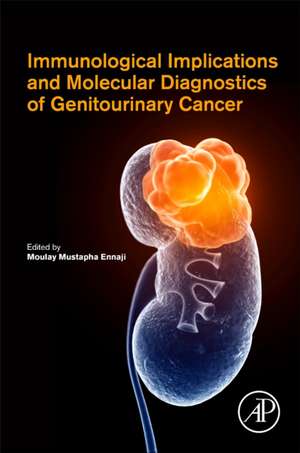Immunological Implications and Molecular Diagnostics of Genitourinary Cancer
Editat de Moulay Mustapha Ennajien Limba Engleză Paperback – 9 oct 2022
- Discusses the impact of the immune system on the initiation, progression and treatment of cancer
- Provides insights on the important role of the suppressor genes and oncogenes in genitourinary cancers
- Shows the advantages of combining clinical issues of urologic cancers with immunological techniques, like immunohistochemistry and immunofluorescence
- Demonstrates the implications genitourinary cancer has on the human innate immune system
Preț: 942.09 lei
Preț vechi: 1181.42 lei
-20% Nou
Puncte Express: 1413
Preț estimativ în valută:
180.26€ • 188.23$ • 148.86£
180.26€ • 188.23$ • 148.86£
Carte indisponibilă temporar
Doresc să fiu notificat când acest titlu va fi disponibil:
Se trimite...
Preluare comenzi: 021 569.72.76
Specificații
ISBN-13: 9780323854962
ISBN-10: 0323854966
Pagini: 498
Ilustrații: 60 illustrations (40 in full color)
Dimensiuni: 152 x 229 mm
Editura: ELSEVIER SCIENCE
ISBN-10: 0323854966
Pagini: 498
Ilustrații: 60 illustrations (40 in full color)
Dimensiuni: 152 x 229 mm
Editura: ELSEVIER SCIENCE
Cuprins
1. Gene suppressor and oncogenes
2. Implication of growth factor's genes in genitourinary cancers
3. Cytokines genes alterations
4. Proteomic analysis
5. Genetic diagnostics and prognostic biomarkers
6. Exosomes as diagnostic and prognostic tool
7. Metabolism defects
8. Clinical genomic relevance
9. Recent advances of immunotherapy
10. Modern therapeutic targets
2. Implication of growth factor's genes in genitourinary cancers
3. Cytokines genes alterations
4. Proteomic analysis
5. Genetic diagnostics and prognostic biomarkers
6. Exosomes as diagnostic and prognostic tool
7. Metabolism defects
8. Clinical genomic relevance
9. Recent advances of immunotherapy
10. Modern therapeutic targets
